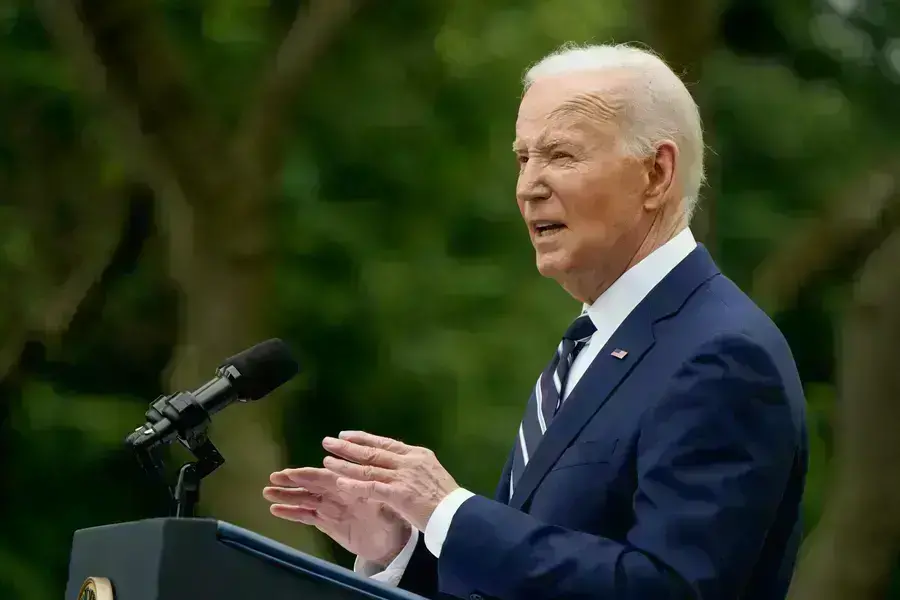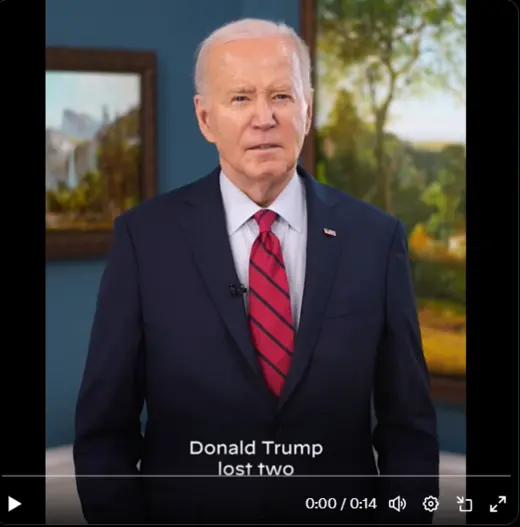Election 2024: Biden Raises Tariffs on China

To beat them you need to join them. That seems to be the message coming out of the Biden White House. Five years ago, Joe Biden criticized Donald Trump’s tariffs on Chinese imports. But to judge by the White House’s decisions this week, Biden has joined his predecessor as a “tariff man.”
Biden announced on Tuesday that he is imposing steep new tariffs on a range of goods imported from China. The tariff rate for electric vehicles (EVs) will quadruple from 25 percent to 100 percent, tariffs on steel, aluminum, and lithium-ion batteries for EVs will more than triple from 7.5 percent to 25 percent, and tariffs on semiconductors will double from 25 percent to 50 percent. Biden said that the tariffs, which are taxes paid by U.S. buyers, were justified because of Chinese “cheating”:
The fact is that American workers are—can outwork and outcompete anyone, as long as the competition is fair. But for too long, it hasn’t been fair. For years, the Chinese government has poured state money into Chinese companies across a whole range of industries: steel and aluminum, semiconductors, electric vehicles, solar panels—the industries of the future—and even critical health equipment, like gloves and masks. China heavily subsidized all these products, pushing Chinese companies to produce far more than the rest of the world can absorb. And then dumping the excess products onto the market at unfairly low prices, driving other manufacturers around the world out of business.
More on:
The move was more symbolic than substantive, affecting just $18 billion worth of goods. (The United States imported $427 billion worth of Chinese goods in 2023.) Existing tariffs have effectively kept most of the targeted Chinese products out of the U.S. market. China nonetheless said that Biden’s “action will seriously impact the atmosphere of bilateral cooperation” and vowed to take “all necessary actions” to protect its interests.
In announcing the new tariffs, Biden said nothing about his criticism of Trump’s tariffs. Back in 2019, Candidate Biden panned Trump’s tariff war with China, noting that American producers and consumers pay for them. As he told Iowa farmers, “It’s really easy to be tough when someone else absorbs the pain.”
Biden also skipped over how his new tariffs undercut his goal of speeding up the green energy transition in the United States. Climate activists argue that the recent surge in Chinese exports of low-cost green technology “would hugely help advance the effort to slow emissions. If China wants to subsidize this process, we should be thanking them.” The administration’s reason for slowing what has been called the good, green glut is that climate considerations need to take the backseat for now to political and strategic calculations. A second China shock would devastate the nascent U.S. green industry, killing political support for a green transition and leaving the United States vulnerable to Chinese economic coercion. After all, what China provides it can also withhold.
This calculation may be correct. But the tariff increases that Biden announced this week highlight how difficult it is to confine the U.S. “de-risking” from China to, as National Security Advisor Jake Sullivan put it, “a small yard and high fence.” Even if this week’s moves are small in terms of the overall U.S.-China trade relationship, the yard is getting bigger and the fences higher. And unless modern economics has it entirely wrong, that will mean less growth and higher costs in the years ahead.
Campaign Update
That happened fast. On Wednesday morning, the Biden campaign released a thirty-second video challenging Trump to two debates.
More on:
Before the breakfast dishes had been cleared, Trump had accepted the challenge:
By lunchtime, the two campaigns had agreed on dates, locations, and broadcasters. Biden and Trump will meet on June 27 at CNN’s studios in Atlanta and on September 10 on ABC. The first debate will be the earliest a presidential debate has ever been held. Indeed, Biden and Trump will square off before either is their party’s official candidate. Trump told a radio host that he would “take anybody” as a moderator. CNN subsequently announced that Jake Tapper and Dana Bash will moderate its debate. David Muir and Linsey Davis will moderate the ABC debate.
The losers in the Biden-Trump agreement look to be the nonpartisan Commission on Presidential Debates, which had arranged past presidential debates, and Robert F. Kennedy Jr. Biden’s campaign informed the commission Wednesday morning that it would not participate in its debates. One reason the Biden campaign offered for its decision was that the commission had proposed holding the debates after early voting had begun in many states. Meanwhile, Kennedy accused the Biden and Trump campaigns of “colluding” to shut him out the debate to “avoid discussion of their eight years of mutual failure.” However, CNN, which is set to be hold its debate without an audience, says it will invite any candidate that polls at least 15 percent in four national polls and has qualified for enough state ballots to conceivably win the Electoral College. Kennedy is close to the first criterion but well short of the second.
We may also get a vice presidential debate this summer. Vice President Kamala Harris has agreed to an offer from CBS News to debate her Republican counterpart. The dates being considered are just after the Republican National Convention ends in mid-July or just before the Democratic National Convention opens in mid-August. Of course, Trump still has to name his vice-presidential choice.
What the Pundits Are Saying
My colleague Sue Mi Terry warned that “as the United States heads into November’s elections there’s a high chance of yet another emergency: renewed provocations from North Korea. Pyongyang has a history of acting out during U.S. elections.” What should be done? Biden should “take North Korean policy off autopilot and launch a proactive effort to deter Pyongyang. Otherwise, he risks encouraging an already emboldened Kim to stage a major provocation.”
Tom Moerenhout argued in Foreign Policy that the United States should stop playing the victim when it comes to trade with China. “Washington must urgently recognize that the current situation is unprecedented,” Moerenhout wrote, “and that it cannot simply ‘protect and spend’ its way out of this challenge—not only because of the prohibitive costs for both consumers and the government but also because such strategies are less effective against the dynamic advancements of China in the battery sector.”
Politico’s Joshua Zeitz wrote that the election of 1824 provides a reminder that U.S. presidential elections can end without a clear Electoral College winner. If the 2024 ends up in a tie, Zietz argues, “we could be on the road to an unthinkable scenario: Democrats win the popular vote for the presidency and House, but Republicans return Donald Trump to the White House through the 12th Amendment mechanism. If history is a guide, it would have profound implications for the future of American democracy.”
What the Polls Show
A series of New York Times/Sienna College polls released on Monday show Trump leading Biden among likely voters in five of six battleground states. Trump leads in Arizona, Georgia, Nevada, Pennsylvania, and Michigan. Biden leads in Wisconsin. Adding Robert F. Kennedy Jr. and other third-party candidates did not change the poll results significantly as Kennedy drew equally from Biden and Trump supporters. The Times coverage of the poll results noted: “Historically, polls at this early stage have not been necessarily indicative of the outcome.” A separate Times analysis of the poll results concluded that “Kennedy could ultimately play a bigger role than he does today” in siphoning votes away from Biden because Kennedy “draws disproportionately from voters who usually back Democrats but have defected to Mr. Trump.”
The Campaign Schedule
The Republican National Convention opens in Milwaukee in fifty-nine days (July 15, 2024).
The Democratic National Convention opens in Chicago in ninety-four days (August 19, 2024).
The first in-person absentee voting in the nation begins in Minnesota and South Dakota in 126 days (September 20, 2024).
Election Day is 172 days away.
Inauguration Day is 248 days away.
Michelle Kurilla assisted in the preparation of this post.
 Online Store
Online Store


